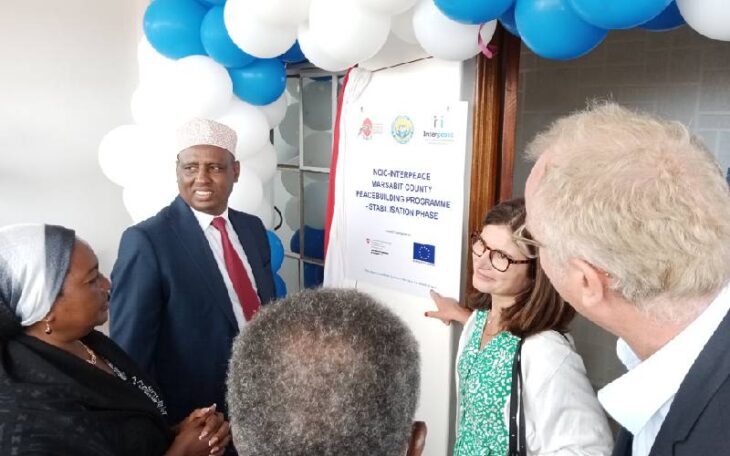MARSABIT, Kenya, Nov 16 – The National Cohesion and Integration Commission (NCIC) has opened an office in Marsabit County to enhance peacebuilding initiatives in the region as the government finalizes plans to reinstate the Kenya Police Reservists (KPR) to bolster security efforts.
The commission, which has partnered with the international organization for peacebuilding, Interpeace and other stakeholders aims at bolstering initiatives to restore everlasting peace not only among local pastoralist communities, but the entire northern region.
Speaking during the launch, Interpeace Senior Regional Representative for the Horn of Africa Dr. Theo Hollander said the organization was pleased to note that incidents of violence had gone down after the government took decisive action that included a security operation and curfew.
Hollander said this move opened a window of opportunity for the emergence of community driven peace processes at the grassroots level.
He said that the organization conducted a rapid conflict assessment in the county one and half years ago that pointed at fight over grazing resources, mistrust between communities and general absence of the government in the peace initiative among others as key factors behind the inter-ethnic clashes, but which now seem to be gradually subsiding.
“Of essence, we have seen significant efforts from the affected communities to bend the spear and try to reconcile,” he noted, adding that Interpeace was committed to supporting the endeavor.
The peacebuilding initiative is supported by the European Union (EU) and the Swiss Agency for Development and Cooperation (SDC).
NCIC Chairman Rev. Dr. Samuel Kobia said Marsabit County had lost over four hundred people to intercommunal violence in the last five years, with Saku constituency being the most hit.
Dr. Kobia regretted that the conflict had also dearly cost the county as property was destroyed, service delivery disrupted, families displaced while development and socio-economic programmes were messed up.
Dr. Kobia while announcing plans by the commission to open 10 centers across the country including Isiolo, Mombasa and Kisumu, said it was encouraging to note that normalcy was slowly returning to the county due to the efforts of the political and religious leaders, peace actors and security teams.
The chairman stressed the need for reconciliation and healing adding, “We must change from a culture of war to a culture of peace, because peace is important for people to live on and work for a better future.”
The event was also graced by among others governor Mohamud Ali, the Switzerland Ambassador to Kenya Valentin Zellweger, the European Union Ambassador to Kenya Henriette Geiger, the Marsabit women representative Naomi Waqo, all of whom hailed the initiatives in place towards cementing peace in Marsabit county and other parts of the country.
In his remarks, Eastern regional commissioner Evans Achoki said that the government was committed to finding a lasting solution to the insecurity in the region with plans to vet and redeploy KPR being finalized.
Achoki pointed out that the region had of late witnessed noteworthy improvements in the security situation after warring communities engaged in dialogue adding that reinstatement of reservists was meant to give impetus to the process.
The RC also called on those in possession of illegal firearms to surrender them to the authorities without delay saying that the government would only allow licensed holders of firearms to possess them.
He said that going by the recent security operation and curfew imposed in Marsabit until the eve of the just concluded general election, illegal firearms must be mopped up from wrong hands.
“The government recognizes the importance of opening this office here in Marsabit as the commission and other actors will be able to respond to issues as they arise,” pointed out the regional commissioner, who also thanked International Organization for Peacebuilding (Interpeace) for sponsoring the initiative.
He said that the government was concerned with slow pace of growth in the county despite huge resources being allocated and that the trend has to stop.
Ambassador Geiger said that the EU has so far supported actualization of devolution in the country at a cost of sh81 billion and underlined the need to devolve services in all spheres.
She said that about sh6.2 billion was being spent by the union to assist Kenya in mitigating the current drought, but emphasized on the need to work on sustainability mechanisms because donors would always pull out at some point.
She noted with appreciation that elections were held peacefully in Marsabit, and herders were now sharing available grazing resources amicably.
The ambassador advised that all communities and groups therein, especially women be engaged in the peace process, adding that the EU was more than willing to continue supporting the initiative now that the results were positive.
Governor Ali said his administration was working on modalities of making local communities resilient in the wake of adverse effects from climate change.
The governor announced that families displaced during ethnic skirmishes would be assisted to resettle through help, to reconstruct their houses, food aid and rehabilitation of schools.
Want to send us a story? Contact Shahidi News Tel: +254115512797 (Mobile & WhatsApp)


